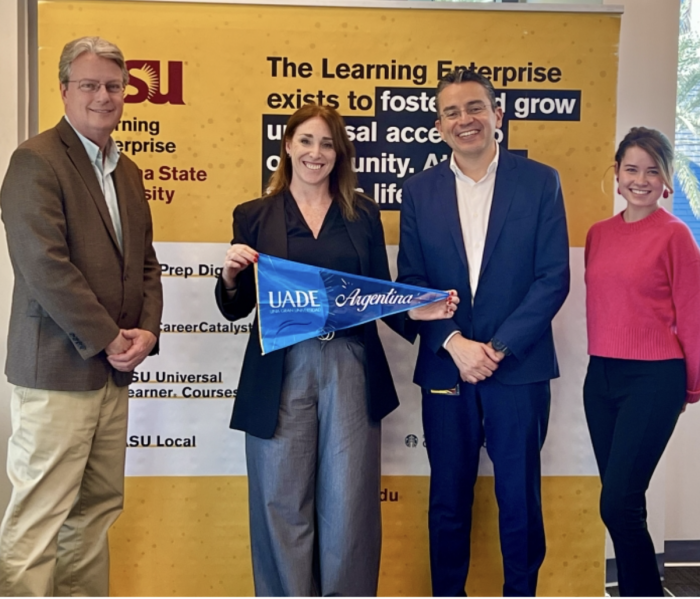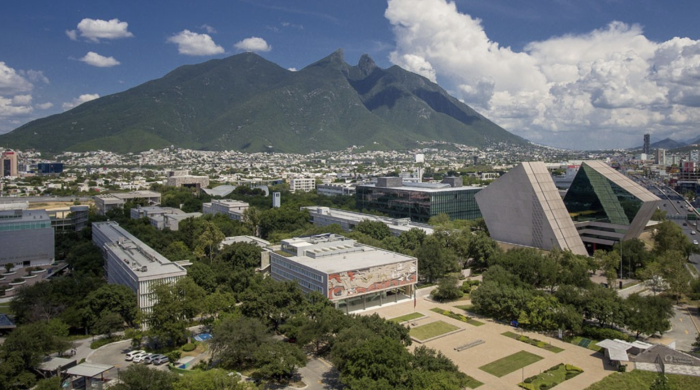¡ASU en Español! Expanding access to learning for Spanish-speaking communities worldwide

Stock photo
How do you drive economic transformation in a world increasingly shaped by technology?
Arizona State University is deepening its commitment to Latin America and the global Hispanic community through a new portfolio of Spanish-language learning programs.
These offerings are part of ASU’s mission to break language barriers and democratize education, delivering critical skills in sectors such as artificial intelligence, immersive technologies and sustainability.
In time for Hispanic Heritage Month, these programs underscore ASU’s growing impact across Latin America, offering new opportunities for learners to engage with topics essential to economic innovation and progress.
A vision for inclusive, global learning
Latin America is experiencing a surge in demand for technology talent, with the tech hiring market increasing by 286% in recent years, largely driven by U.S. and global companies outsourcing roles to the region.
ASU’s new Spanish-language programs, accessible to all learners globally, complement its burgeoning partnerships in countries including Argentina, Colombia and Mexico, among others, where the university is already collaborating with local institutions to develop workforce-ready skills.
Collectively, these efforts are creating opportunities for learners to thrive in a technology-driven economy while addressing the local challenges of each community.
“ASU’s global vision is about more than delivering education — it’s about empowering communities and building resilience,” says Maria Anguiano, executive vice president of ASU’s Learning Enterprise. “By expanding our presence in Latin America and Spanish-speaking communities, we’re not only equipping learners with world-class skills but also working hand in hand with local leaders to spark long-term economic development.”
New Spanish-language learning offerings
ASU’s latest suite of Spanish-language programs includes the following courses designed for both professionals and educators:
- Digital Intelligence Certificate (covering topics like digital communication and emotion, digital creativity, digital tools and well-being, and digital safety and security).
- Foundational Sustainability Skills and Competencies Certificate.
- Big Data and Learning Analytics in the Global Economy Certificate (delivered in person in Spanish through Thunderbird School of Global Management).
Other offerings and certificates coming soon:
- Generative AI in the Workplace.
- Teaching and Learning with Generative AI.
- Using Immersive Technologies in Education (Augmented Reality, Virtual Reality, Metaverse).
These programs focus on the evolving needs of Spanish-speaking professionals to mobilize their careers and shape the workforce of the future. Meanwhile, ASU’s partnerships with institutions and organizations across Latin America are helping to localize and personalize learning opportunities.
Argentina: Immersive tech for the future of learning
In Argentina, ASU is partnering with Universidad Argentina de la Empresa (UADE) to provide advanced training to over 2,000 faculty members, integrating AI and VR into classrooms. The VR market in education is projected to grow from $4.4 billion in 2023 to $28.7 billion by 2030, with AI adoption accelerating rapidly.
“AI and VR are transforming learner engagement and retention,” says Paula Catalina Iglesias, head of UADE’s Teaching Lab. “With ASU’s support, we’re reimagining learning for the next generation.”
Key collaborators include the University Design Institute, Next Lab, the Academic Enterprise, EdPlus and faculty from The College of Liberal Arts and Sciences.
Colombia: Empowering entrepreneurs and business innovators
Heading just northwest, in Colombia, ASU is also collaborating with Colegio de Estudios Superiores de Administración (CESA), one of the nation’s top business schools, to deliver advanced innovation and leadership training to upcoming business leaders. The Advanced Innovation course, featuring ASU faculty experts like Eusebio Scornavacca, provides strategies for addressing complex business challenges.
“Innovation is at the heart of creating a better future and solving global challenges,” says Scornavacca. “Partnering with CESA enables us to equip students in Colombia with the mindset needed to thrive in today’s dynamic business environment.”
“Partnering with ASU allows our students to access a global perspective on innovation while addressing the unique challenges facing businesses in Colombia,” said Emilia Restrepo, Presidente of CESA. “This partnership strengthens our commitment to developing leaders who will shape the future of our economy.”
Mexico: Building a high-tech workforce
In Mexico, ASU has forged two key partnerships: one with Tec de Monterrey, and another with the Iberoamerican Technology Foundation (ITF) and Santander Universidades. Tec de Monterrey’s 31 campuses are central to its local economy. Its partnership with ASU brings six new engineering courses for master's students, preparing them for industries like automotive and aerospace.
“Our partnership with ASU equips a new generation of professionals with the global skills needed to meet the demands of Mexico’s dynamic industries,” says Adriana Vargas-Martínez, dean of postgraduate studies at Tec de Monterrey.
ASU’s collaboration with ITF and Santander focuses on Mexico’s growing semiconductor industry, projected to reach $1 trillion by 2030. The program, which trains 200 faculty members in Baja California, builds a talent pipeline to meet high industry demands.
“This initiative leverages ASU’s engineering expertise and ITF’s regional knowledge to drive semiconductor innovation,” says Kyle Squires, senior vice provost of engineering, computing and technology at ASU and dean of the Ira A. Fulton Schools of Engineering.
A bold foundation for lasting impact
ASU’s collaborations across Latin America reflect a larger vision: to be a global leader in democratizing education, fostering innovation and promoting economic resilience. In addition to these strategic partnerships, ASU’s new open-enrollment Spanish-language programs provide more flexible opportunities for learners across the region to acquire critical skills for the future of work.
“We’re just getting started,” Anguiano says. “The potential for cross-border collaboration to drive economic and social progress is immense, and ASU is proud to participate in this effort.”
More Local, national and global affairs

ASU champions veterans' success and national security
Arizona State University has a long history of supporting the military — whether through veteran education, groundbreaking research that improves their well-being, or innovative programs that…

ASU named a top producer of faculty, student Fulbright awards for 2024–25
When faculty and students travel abroad on a Fulbright award, they’re often working at the forefront of current events and cultural change.David Androff, a professor in the School of Social Work at…

Overdose crisis involves more than opioids, says ASU social work professor
News coverage about the escalating number of drug overdoses in the United States can lead many to conclude that so long as you’re not overdosing yourself, the crisis doesn’t really affect you.Wrong,…



